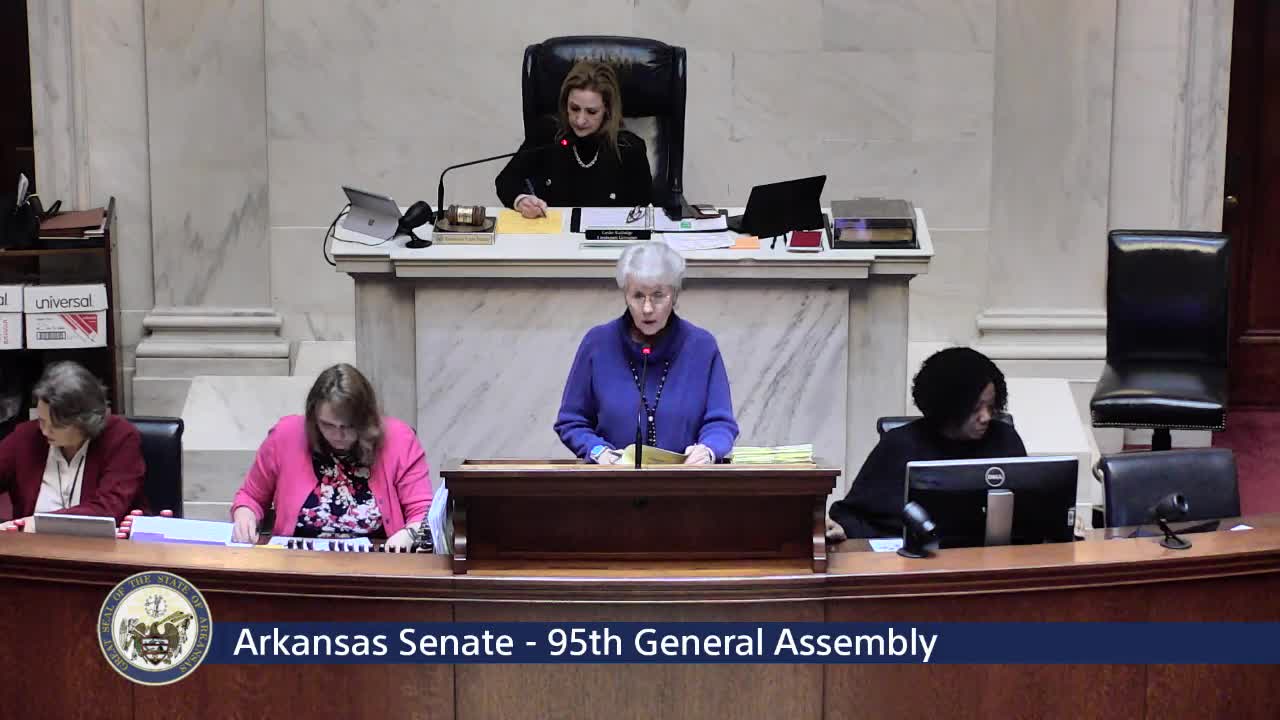Senate approves 'best-and-final' offers for RFPs; expansion of emergency procurement authority rejected and later expunged
Get AI-powered insights, summaries, and transcripts
Subscribe
Summary
The Arkansas Senate on Feb. 10 approved a change allowing agencies to seek best-and-final offers after issuing clarifying updates to requests for proposals, rejected a separate bill to expand emergency procurement to governor-declared disasters, and later voted to expunge the failed vote.
LITTLE ROCK — The Arkansas Senate on Feb. 10 passed a bill allowing state agencies to request “best and final” offers after issuing limited clarifications to requests for proposals (RFPs), while rejecting a separate measure to expand the definition of critical emergency procurements to include governor-declared states of disaster. The Senate later voted to expunge the record of the failed vote on the emergency-procurement bill.
Senate Bill 165, sponsored by Senator Dodson, passed by a roll call of 27 yeas, 0 nays, 6 not voting and 1 present after debate. Dodson described SB165 as “a very small change” to Arkansas procurement law that would let a procuring agency, after reviewing proposals, issue a minor clarification and invite eligible offerors to submit a best-and-final offer rather than restart the procurement process.
The measure applies to requests for proposals, not sealed-bid procurements. “This was actually brought to me by the department,” Dodson said, explaining that RFPs sometimes require clarifying language after submissions and that allowing best-and-final offers is intended for minor clarifications, not substantive changes that would require rebidding.
Senators questioned how the change would work in practice. Senator Irvin asked whether adding the word “clarify” would alter what could be discussed after a submission deadline; Dodson replied the clarification occurs after proposals are received and is limited to minor points so that all eligible offerors can submit a best-and-final offer. Senator King and others pressed on whether the change would affect sealed bids; senators clarified the bill concerns RFPs, where price may be negotiated later, not sealed-bid procurements where final prices are fixed at opening.
Senate Bill 166, also sponsored by Dodson and intended to expand the definition of “critical emergency” to include a gubernatorial declaration of state of disaster (allowing emergency procurement methods for declared disasters), failed on a roll call of 17 yeas, 2 nays, 10 not voting and 5 present. Dodson said the bill would limit emergency procurements to declared disasters and listed examples such as debris removal and sandbags. Opponents raised concerns about scope and potential fiscal effects.
After the failure of SB166, Senator Dodson moved to expunge the record of the failed vote. The Senate adopted that motion by voice vote, and the failed roll-call result for SB166 was ordered expunged from the record.
Discussion on SB165 included questions about fiscal impact. Dodson said the fiscal effect would be determined case by case by future procurements and that the change could theoretically reduce costs by allowing offerors to lower prices during a best-and-final round. Senator Stubblefield and Senator Murdoch pressed whether the change would permit reopening price competition in ways that blur sealed procedures; proponents emphasized the distinction between RFPs and sealed bids and said best-and-final offers are an administrative tool to clarify minor ambiguities without restarting an entire procurement.
Votes at a glance
- Senate Bill 165 (procurement: allow best-and-final offers after clarifications to RFPs): Sponsor — Senator Dodson. Vote — 27 yeas, 0 nays, 6 not voting, 1 present. Outcome — passed; transmit to House.
- Senate Bill 166 (expand definition of critical emergency to include governor-declared state of disaster): Sponsor — Senator Dodson. Vote — 17 yeas, 2 nays, 10 not voting, 5 present. Outcome — failed; vote later expunged by motion of Senator Dodson adopted by the Senate.
What it means
SB165 changes procurement practice for RFPs by formally allowing agencies to issue limited clarifications after proposals are received and to invite eligible offerors to submit best-and-final offers. Lawmakers emphasized the bill is not intended to convert sealed-bid procurements into reopenable competitions and said substantive changes would still require rebidding. SB166 would have permitted emergency procurement procedures during governor-declared disasters but did not secure enough support and its failed roll-call was expunged from the official record.
Officials and proponents said the RFP change was requested by the Department of Transformation and Shared Services (the department identified in testimony as the requesting agency) to avoid restarting procurements for minor errors, while opponents sought clearer limits to prevent unintended reopening of competitive elements.
Community impact and next steps
The immediate impact is procedural: agencies that rely on RFPs will have an explicit statutory mechanism to seek best-and-final offers on limited clarifications. Fiscal effects will depend on individual procurements going forward, and the failed SB166 means emergency procurement authority will not be broadened to include governor-declared disasters as of this session. SB165 was transmitted to the House for further action.
Ending
Lawmakers debated technical limits and oversight during floor discussion; senators on both sides requested that agencies continue to distinguish RFP processes from sealed-bid procurements when implementing the change.
